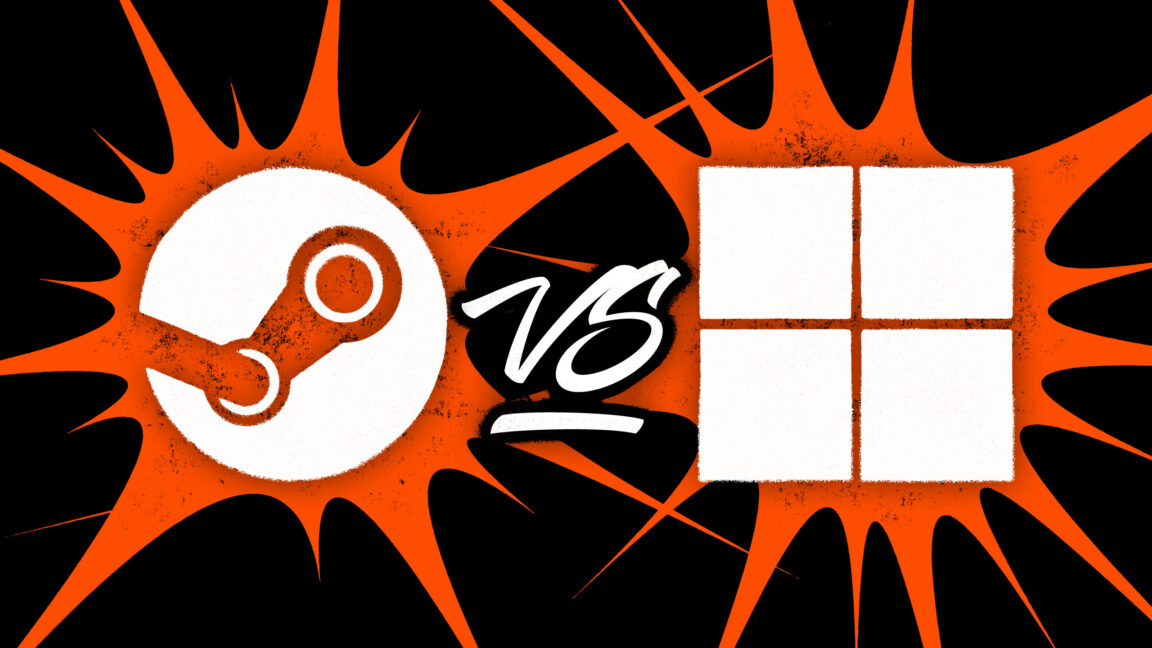I believe it, Windows bloat these days is so bad. I keep telling my friends Tarkov runs better on Linux if they’d just let me play the goddamn multiplayer I’d be golden
I’m really curious to see what kind of performance gains the Xbox-mode or whatever they’re calling it is going to provide. I don’t know if it’ll reach SteamOS levels, but it does legitimately look like they’re taking the bloat’s hit on gaming seriously with the Xbox-branded ROG Ally.
The reality is that mostly people aren’t going to leave Windows, so if Valve and Linux force Windows to improve it’s still a win.
I think we’re beginning to see a serious shift about how people view Linux. I do think valve being on Linux will significantly legitimizes it, and drivers will become much more accessible for it. In the next decade I think we will see a big migration of gamers to Linux. Being on Linux myself, the experience is even more streamlined and less glitchy than just a year ago, just because of the widespread adoption of OS’s like steamOS and bazzite.
Linux will never be mainstream while it’s controlled by nerds. I mean there is no uniform interface (there’s so many guitar options) and when people want to learn it, the support is from people who think “it just works”.
Yeah, three is the limit on control panel flavors within an OS
Still more consistent out of the box than the dozens of GUIs of Linux.
This could be smart if the largest mobile OS, Android, didn’t have dozens of GUIs/Styles depending on the manufacturer’s whim
Android is still more consistent than PC Linux. Most Android interfaces are nearly identical. Give me and Android phone that I’ve never used before and I know how to perform the most common tasks without help. Not the same.
Windows was for nerds in its early days
Windows 95 launched like a rock concert and since computers came with Windows, everyone’s experience was the same so you did have KDE installed then go look for help and have people say “no no no. Install Gnome” like you get with Linux. You want linux to be mainstream, you need to appeal to the average dumb person which means ditch all but 1 interface.
The steamdeck a handheld gaming PC comes with Linux, and several handheld gaming PC’s are beginning to follow suit, some PC manufacturers already offer Linux as an option. Even so, most gamers, which is who I was talking about, build their own PC’s and pick their own OS’s to begin with.
The Steam Deck is an exception as it has a highly specialized OS with functionality and optimization limited to one thing: playing games.
I mean, DOS was a base OS that had several frontend GUIs.
Most Linux versions come with the frontend preconfigured unless you get specifically the server version of the OS.
What’s going to happen is one of the Linux front ends is going to see widespread adoption/support, and it’s looking like it’s going to be KDE Plasma. Hopefully the others aren’t just abandoned and left to rot.
You statement is invalidate immediately by saying DOS was a GUI. It was text based and the text commands were consistent across most versions of DOS.
I said DOS had GUIs, not that it was one
They’ve promised that exact same thing for like at least three major windows versions.
And Windows 10 was clearly faster.
Than Windows 11, that is.
I think this time actually does have the potential to be different. They’re co-launching an Xbox-branded handheld PC designed to go head-to-head with the Steam Deck while downplaying the future of dedicated consoles.
Microsoft’s gaming division is going all-in on PC, so it matters more than ever.
They said all those exact corporate blowhard promises when the introduced the gamebar and the Xbox windows store and a “gaming mode” lol.
Yeah, but they were also still making new standalone gaming boxes with a dedicated OS, and they didn’t have the Xbox division take the lead on game mode.
Linux and Mac gaming also weren’t a threat, and the solution to a bloated Windows installation was more horsepower, which was relatively cheap.
Now the market is completely changed. The Xbox Series S and X have had their lunch eaten by Playstion and Switch. Linux gaming is exploding because of the Steam Deck, while more-powerful Windows handhelds are performing worse with worse batteries than the Deck because of Windows bloat.
Mid-range GPUs cost more than an entire high-end gaming rig from 5 years ago, so high-end gaming PCs are rarer than ever.
Microsoft has to do something. And what they’ve chosen, for now, is to partner with Asus to launch a true Xbox-branded competitor to the Deck. To do that, they have to actually be competitive. There’s 2 keys to that. One is Gamepass, and the other is moving Windows out of the way of the game experience.
The reality is that mostly people aren’t going to leave Windows, so if Valve and Linux force Windows to improve it’s still a win.
While I mostly agree with this, every time I see this mentioned it reminds me that
MS-DOSWindows was not very popular, until a Microsoft employee offered to port Doom toDOSWindows, because he saw that if games ran on a platform people would use it and migrate naturally, that employee was called Gabe Newell. So I do have some hope that there’s some bigger migration, and in fact we’ve seen the numbers steadily rising, and these sort of things tend to be exponential, so I wouldn’t be surprised if it picks up speed.DOS was the most popular OS for gaming at the time and Doom was released first on DOS by id.
Gabe Newell and team ported it to Windows 95.
Oops, thanks for the correction I’ll update the post
I did not realize Gaben worked for Microsoft. So he knows wtf he’s doing with the steam deck. I think he is 100% trying to recreate that OS migration of the 90s
Windows was wildly popular prior to Doom. Doom for Windows 95 was a showcase for DirectX, not Windows.
Doom was on more systems than Windows 95, yes, but that’s a little misleading. First off, it was released several years before Window’s 95. Secondly, people upgraded computers less often back then, and Windows 95 wasn’t packaged with most systems and wasn’t distributed online. You had to actively decide to go to a store and buy it.
Third, the vast majority of Doom copies were the shareware version of the first campaign. It was tiny and free. People would bring their floppy to a friend’s house, or they’d post it on a bbs for download.
The port to Windows 95 was a technical showcase of the advantages of using DirectX. It showed that Windows had integrated features that could be used to enhance games with minimal development cost, and that games could be run without having to exit Windows to DOS, which was a huge hassle required for most games at the time.
Tarkov runs on Linux!? I thought they had kernel anticheat that didn’t work
Pvp doesn’t work yeah, everything else does
dang i couldn’t even get the launcher to work when i tried with lutris the other day
That’s odd, my best guess is the version of proton lutris is trying to use is installed incorrectly. I had that issue in my laptop for awhile.
I also had issues when I tried to install Tarkov on an NTFS drive.
it’s possible, i tried several proton and ge-proton versions and was getting a dotnet error that it couldn’t ensure a single process iirc
Ah, there’s a special installer on the lutris site that should install all that, did you use that?
i will look into that thanks!
I’m thinking of keeping timer next to me for all the time I waste literally waiting for Windows 11 to load the bloody right click menu (and other things) at work.
Take aways:
- Sample set is of 5 games
- Lenovo drivers are much slower than Asus
- There are 2 games where windows is neck to neck or better, 3 where SteamOS is far ahead
Some doubts:
- Did the author run the benchmarks few times to rule out shader compilation. 99%ile would be helpful.
- I wonder if it makes sense to test DirectX10, 11 and 12 games separately to better understand where Proton has an edge.
- I wonder what all settings can be tweaked in Windows to find potential fixes (core isolation, cpu boost, power profiles).
Point is Microsoft and OEMs need to do better, however not every game or subscription services work on Linux, so in the interim time users should know what they can do to close the gap better.
This is really not surprising to anyone who has used modern windows and Linux recently. Windows is so incredibly bloated, whereas Linux is a true real-time OS basically out of the box.
Unless you use an RT kernel, Linux is not a realtime OS and certainly not a true one.
Because, you know, terms have a meaning.
Right but switching to an RT kernel is trivial for basically any mainstream distro. You can do it from the package manager.
True, I just wanted to clarify that by default Linux doesn’t run on an RT kernel.
And tbh, an RT kernel is really not desirable for most applications, which is why it’s not default. All these RT guarantees cost a lot of performance, and in most cases a guaranteed latency is not worth losing performance over.
In fact, using an RT kernel would be just the opposite of what you’d want on a gaming system.
While the bloat exists, even debloated windows wouldn’t match proton because that’s not the only reason. Despite bloat there are two games in this test the actually do similar or better than SteamOS. This means there’s a confounding reason for the difference, not the bloat.
I recently switched from windows (with a debloat scrpit ran on it) to linux mint and I was shocked at how much faster it booted. When I turn my pc on I usually get up and do something else for a bit (not because windows is THAT slow but because I could spend the minute it takes to turn on to make lunch or something) and linux booted before I was out of my chair.
Did the author run the benchmarks few times to rule out shader compilation.
Why should the author rule it out? Honest question. If shader compilation leads so worse real world experience for gamers on Windows than SteamOS, it is a valid point to include.
Because I’m more curious about why things are the way they are just like the author, and would like to understand this with more data points, only making the comparison more helpful. I’m not saying author “should” consider impact of shader compilation, but I’m saying had they done, we’d understand the difference better.
They added asus vs Lenovo drivers data points, which alone tells us that driver optimization is responsible to a great extent. All I’m saying here is more data is more helpful.
Maybe even after taking care of that, the difference is huge, which will tell us its not enough to have precompilation of shaders. Maybe it does reduce the gap, telling us that potentially dx11 games might tend to do similarly.
Saying “RTX 5060 is better than 9060 XT” with 5 games tested is one level of comparison, but if they are grouped into RT and non RT games, games with 8gb and 16gb VRAM requirements, games with and without nVidia partnership, isn’t that just more detailed and an even better comparison point?
Did the author run the benchmarks few times to rule out shader compilation
Really grasping at straws there, eh? I’m no big fan of Ars but I hope we can assume they’re not quite that incompetent.
Methodology is important to a robust result. It’s weird that you take issue with their considerations there.
It’s not a slight, as I said it’s a doubt, not criticism. I’m not saying “did the author EVEN …”
Your other doubts and concerns seem slightly biased, e.g. wondering what settings could be tweaked on only one of the systems being tested and then reminding us all that there do still exist some things that won’t run on SteamOS. It’s only that one that is outright ridiculous.
Biased to what? Point of comparison is to figure out why things are the way they are and use that information to get the best of both worlds? It’s not very helpful if the conclusion stops at “x is better than y”.
Going deeper into “why” Proton is doing better in 3/5 games but not in 2/5 will only help users of both operating systems to make better informed decisions and get everyone closer to root cause other than “bloated windows” or “just use linux”, potentially even leading to improvements to both sides.
deleted by creator
Preach. Studios that make games with anti cheats and what not should reconsider how they handle Linux as they’ll only get even more players, who’ll probably be even more loyal due to their Linux compatibility. I know cheating is a big issue in online games, but adding invasive kernel level code to detect that is just adding system level vulnerabilities just to prevent cheaters from cheating seems like an overkill. It’s not like cheating mouse and keyboards don’t exist and cheaters have evaporated entirely due to anti cheat.
I found the same thing on CachyOS (another Arch fork). The increase for me was staggering. Lies of P went from an unstable 144fps on windows 11 with an overclock (OC) on my GPU to 200fps in Cachy. Settings were all maxed out at 1440p. I noticed a similar jump from other games. Modded and vanilla NBA 2K25 went a stuttery mess at 172fps (frequent dips down to 72fps) to a steady 180fps with NO dips (that’s my monitor’s limit). I like to test things on The First Descendent, and it went from an unstable 79fps with maxed settings to 119fps. And while I don’t have numbers for it, The Witcher 3 Next Gen (vanilla and heavily modded) run a lot smoother. But after ten years, that game has been optimized out the ass.
I did notice, however, that the increase in performance diminished greatly as I turned down settings. On Windows 11, I would notice a way “higher” increase in frames. For Example, I could tweak settings in the First Descendent like Global illumination and increase frames in Windows 11 to 109fps, but still unstable. In Cachy, if I did these things, I didn’t really notice a meaningful impact.
RT also performs slightly worse on Linux. But I figure anyone using Linux might be the same type of person to not care about RT.
My hypothesis is that without the CPU resources being eaten up by things like Windows Defender, the CPU is able to process more data quicker, reducing GPU wait time. I don’t have data on that, I would need something as in depth as presentmon from Intel for testing. Arch has forks of that, but nothing nearly as in depth, and PresentMon has declined any Linux support in the foreseeable future.
I should mention, the OVERALL jump is ~40% going to CachyOS. And we know that the jump from Windows 10 to 11 saw a ~27% hit due to the new Windows Defender.
My system is 64GB of SK Hynix DDR5, 9070xt (on my Windows Partition it’s OC’d, but on CachyOS I leave it stock), and a 9800x3D that has been manually OC’d in the bios and a 240mm AIO. I leave the panels off my O11 D Mini. The motherboard is a Gigabyte X870 Aorus Elite (2x8 pins for the CPU delivery).
For all the FPS data, I pulled it from Steam on Cachy which uses presented frames instead of actual frames. Basically, the frames the GPU is presenting to the monitor, not necessarily what your eyes are seeing.
On my Ally, I also noticed a difference swapping to SteamOS. Something to keep in mind with anyone planning to do that, you can allocate up to 6GB of RAM to the iGPU before Arch/SteamOS gets affected. I just don’t see anyone telling you you can do this.
Edit one day later- I played Enshrouded on CachyOS. I will report that my 9070xt underperforms at max settings. Unstable 80fps with dips down to 50fps, but the Frame Time Pacing makes it feel worse. It stutters like it’s running at 50. Turning down settings again only increased frames by 5fps, which is not marginal at these rates, but did not help with the stuttering issues. I think it’s rendering things similar to Minecraft. The comparison I have is my 7800xt, which at max settings a year ago was able to run in Windows 11 at 70fps, but equally unstable. Therefore, I’d hypothesize that if I ran present on I’d just see high GPU wait times.
Dope, detailed writeup, thank you!
RT = Rollercoaster Tycoon?
Ray tracing is my guess
Yes /s
“Hello everyone, and welcome to another video”
- Marcel Vos
“Drowning 50000 guests in 20 seconds”
You could use Nsight, it has a Linux version and is very in depth (shows every draw call, also has one that shows very detailed CPU tasks)
Of course harder to use than presentmon
I will report back
Yes but Microsoft Teams runs like dogshit on my Linux laptop. Checkmate atheists.
😭😭😭 Sadly, Microsoft Teams runs like dogshit everywhere
I was using Teams on Firefox and I’ve been thinking that FF is the problem that Teams’s working horribly, but man, it works horrible on chromium as well
It is more impressive when you realize that those games were meant for Windows and require a translation layer (Wine and DXVK).
Wow, some of these are showing huge gains with Steam OS
Windows runs better on Linux than on Windows…
Linux runs better on Windows than Windows.
Are you saying we should run Linux Subsystem inside Windows inside a VM on Linux for maximum performance? 🤔
Imagine if Valve decided to ship HL3 only on SteamOS :)
They’re already going to only ship it through Steam. As long as you’re using Steam, they don’t care.
Imagine leveraging your monopoly in attempt to gain market share in another market.
Except they wouldn’t be? SteamOS is just fancy Linux, so they wouldn’t be directly gaining market share & I don’t see how them releasing a game only on one (free and open source) platform is suddenly wrong? In a world where virtually every PC game already does that, just for Windows
Have you forgotten about Nintendo, Microsoft, and Sony (actual monopolies: controls hardware, software, marketplace, etc)
Android is just fancy Linux. iOS is just fancy BSD. I guess neither can be a monopoly.
Whataboutism seems to be admission of truth these days.
-
Android is, at its core, an open source mobile operating system. What Google has done with it is monopolize all of the software for the platform. There are competitors (read: GrapheneOS, F-Droid) which are also based on the Android Operating System but outcompeted by Googles market position
-
iOS shouldn’t even be in this conversation, not open source & completely walled garden
-
“Whataboutism seems to be an admission of truth these days” HUH? At what point did I engage in whataboutism, i simply pointed to other companies that have set standards for gaming accessibility in the market.
Valve:
-
Has Steam, the largest videogame platform on PC. You claim it’s a monopoly but it’s not because it has direct competitors in Epic Games (Fortnite is not a small game), Riot Games (League and Valorant are not small games), Battle.net (WoW, Hearthstone, Overwatch are not small games), etc
-
Developed the proton translation layer (which you yourself made this post for), and released it open source so anyone can use it. I myself leverage Proton for Linux gaming on a daily basis (I do NOT run SteamOS)
-
Released SteamOS, which is a fork of Arch Linux, as a means of helping gamers break away from the real monopoly of Microsoft/Windows
-
Is not creating a walled garden the likes of which we have seen in every xbox, playstation, and nintendo console. If Epic, Riot, Blizzard, etc wanted to release a launcher for Linux (and subsequently SteamOS) they could. They just choose not to, because they feel it doesn’t make financial sense for them to do that.
Developed the proton translation layer (which you yourself made this post for), and released it open source so anyone can use it. I myself leverage Proton for Linux gaming on a daily basis (I do NOT run SteamOS)
Proton stands on the shoulders of giants like Wine and DXVK. What Valve did is still impressive but they didn’t start from scratch.
Definitely, and I’ll never try and make the argument against that. However what they did was definitely a significant improvement on these pre-existing translation layers.
Linux gaming can be clearly defined as pre-proton and post-proton because it was such a huge improvement to the experience (one-click installs, large number of support in games, gaming via proton counting as a Linux sale in publisher metrics, etc)
And I’m speaking from personal experience, before proton I had a hard time getting pretty much every game I tried to play working on Linux (and tbf a large part of this is probably me fumbling the installation but I’m not an untechnical person either, so I’m sure this was the experience for many)
I’ve had this discussion enough times here that I’m bored of it and will get dogpiled as always. I’m mostly bored of explaining what a monopoly is because the rest of your argument is that Valve is a benevolent company. I’ll just say they sell gambling games to children which should be enough measure of their benevolence and it extends to their other self-serving activities.
Valve fans are the only video game tribe on Lemmy that actively applauds monopolistic practices. I’m blocking you now because you guys are so boring. Goodbye.
Go ahead and block me 💀 your post history shows you having this same argument and taking the same action every time.
You defend this point endlessly and the minute the conversation starts to pile up, you block the other person.
✌️ Enjoy the echo chamber you’re creating for yourself
-
Oh dear Microsoft, you had everything and you pissed it away again
I last checked in December. At that time Linux had an all time high usage rate of 5.6%. For a platform that’s existed since the early 90s, 5.6% is the highest they’d ever achieved.
So I wouldn’t exactly say microsoft EVER pissed it away. They still have, and always have had, dominant market share of users. And they do so by charging hundreds of dollars as opposed to a free alternative.
They had internet explorer dominance, they pissed that away
They had PC gaming OS dominance, they’re now pissing that away
The closest thing they had to internet explorer dominance is saying that it was manditory to be installed in every OS. The OS had market dominance, and you couldn’t uninstall internet explorer.
But actual usage? Everybody used Netscape.
People who knew what they were doing with computers used Netscape until it died, those people went to Mozilla suite and then Firefox (well, Phoenix then Firebird then Firefox). But that was a shrinking minority of people on the internet at the turn of the millennium.
Practically everyone else used IE (90%+ of web traffic at its peak) and continued to do so until Google released Chrome and shone a light on how little Microsoft had been doing for nearly a decade.
Dominance was dominance however they got it, and they pissed it away through complacency, somewhat similarly to what they’re doing now.
This is your rose tinted hindsight fantasy.
That’s still without NTSYNC patches, right?
I heard they are irrelevant for Proton as it has its own fsync.
Games run faster with LMDE6 than they did with Windows 10 on my 5800X3D/7900XTX PC.
Windows games used to run better on wine 15 years ago and Windows bloat/telemetry has only gotten worse since then.
I like to see this.
This is not my experience out of the box (in debian so not truly a comparison) on legacy hardware. (Which shouldn’t be running win 11 anyways).
We are definitely most of the way there with proton but game devs/publishers have a lot of room of improvement.
deleted by creator

















